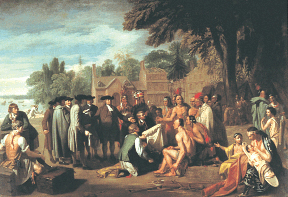
It was only fitting that the world premiere of Brotherly Love was held on the banks of the Delaware River, at the place now known as Penn’s Landing. At the heart of the oratorio—which sets excerpts from the epic poem by Dr. Daniel Hoffman, the Felix E. Schelling Emeritus Professor of English, to the music of composer Ezra Laderman—was the treaty between William Penn and the Lenni Lenape Indians, signed just a few miles up the river in 1682. (It was also fitting that, for the occasion, the University of Pennsylvania Press reissued the book version of Brotherly Love, which had been a finalist for both a National Book Award and the National Book Critics Circle award when published in 1982 by Random House.)

Photo: Elizabeth McFarland
The oratorio, wrote Laderman in his program notes, “creates a musical tapestry that evokes the multi-layered textures of the poem.” It was performed twice in March by the Philadelphia Singers, backed by the Concerto Soloists Chamber Orchestra, at the Independence Seaport Museum’s concert hall. Under the direction of music director David Hays were baritone Richard Zeller (who sang the words of William Penn), soprano Heather Buck (Hoffman’s inner “voice of conscience”) and tenor Jon Garrison (“commentator on the overall action”), while the text and illustrations were projected on two walls. Hoffman, poet-in-residence at Penn and a former Poet Laureate, says he followed W. H. Auden’s advice on giving the composer free rein and letting the music predominate. And the “splendid” performance of the Philadelphia Singers and their soloists made it a “living experience” for him. He also says he learned about the “vast difference between being a poet alone in my study with my Olivetti or my pen, and having to work in collaboration with large organizations in different fields.
“The music I thought was really stunning,” he adds, “and I was very pleased with the projection of the text and illustrations, so that the listeners could have a sense of the shape of the poetry. And it dramatized parallels I hoped to draw between the Indian pictographs and the white man’s paintings.”
Hoffman appeared on stage to speak the bleak, compassionate words of “Dr. Ward of Kentucky,” who in 1820 ministered to the few dying members of the Lenni Lenape in Indiana. They had been evicted from their lands through a fraudulent treaty perpetuated by Penn’s son Thomas, and their chief—“a sad shadow fading between the trees”—had given Ward the sacred Walam Olum, a pictorial history of the tribe, to keep the memory alive. (The only surviving copy of the Walam Olum is in the notebooks of Professor Rafinesque in the special-collections department of Van Pelt Library.)
The Walam Olum and West’s painting were what first sparked Hoffman’s imagination, and he would eventually weave them into his long, modernist poem—along with his own words, the letters of William Penn and other writings. Both the poem and the oratorio employ tones that are in turn elegiacal, idealistic and tough-minded. (“Before there was a Philadelphia/There was a Philadelphia Lawyer,” sang Buck, piercingly, while the chorus, describing an unnamed settler, intoned: “He’d as like run the tax-collector back to Philadelphia with a ramrod up his ass/As shoot an Indian in the heel to watch him dance.”)
In a sense, Brotherly Love had its genesis in 1948, when Hoffman first came to Philadelphia and found it in a “ferment of reform” led by Richardson Dilworth and Joe Clark. “I thought that Billy Penn’s statue, then the highest structure in the city, was spreading his spell across the town that he founded,” he recalls. “Later, when Nixon was president and was putting Quaker protesters against his unjust war in jail for ‘disturbing the peace,’ I thought, ‘What would our country be like if someone like Penn were running it?’ This became a very personal burden for me.” Since most American poetry back in the seventies was “confessional and autobiographical,” he notes, “I had a sense of swimming against the stream. But I persisted.”
The book took more than a dozen years to write, says Hoffman, “and was the result of my becoming convinced that the early history of Pennsylvania had not been adequately told; that Penn was a forgotten Founding Father; and that the story of his equal treatment of the Indians and the betrayal of his good intentions by his successors was an important and very moving aspect of American history.”
In writing the poem, he became “convinced that Penn’s idealism anticipating the Bill of Rights by 100 years was a permanent contribution to American political culture.” Unfortunately, he adds, “the subsequent history shows how difficult it is to live up to those ideals. That’s what ideals are for—to put perhaps unattainable goals constantly before us.”




